Politics
How BJP's Kerala Christian Outreach Is Playing Out On The Ground
S Rajesh
Jan 18, 2025, 01:41 PM | Updated Jan 24, 2025, 05:39 PM IST
Save & read from anywhere!
Bookmark stories for easy access on any device or the Swarajya app.
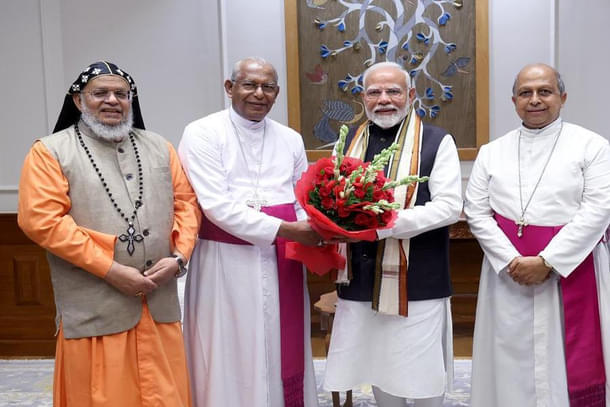
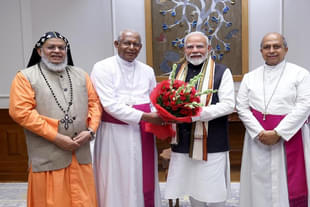
When one looks back at the political developments in Kerala in 2024, two things stand out — the historic victory of the Bharatiya Janata Party (BJP) from Thrissur and a significant rise in the party's vote share.
One factor ascribed to the Thrissur win was the party’s ability to garner support from a sizeable number of Christians, who had traditionally been supporters of the Congress. It was seen as a successful culmination of the party’s outreach to the Christian community.
However, some months later, when the party lost the Palakkad assembly bypoll, held in the backdrop of the protests at Munambam against the Waqf board’s claim to property (mainly belonging to Christians), questions were raised about whether the outreach had really worked.
Given the small margin of its defeat in the 2021 assembly election, the expectation was that support from Christians would help tip the scales in favour of the BJP.
Party leaders this writer spoke with, however, attribute the Palakkad loss to other reasons. “We did receive a good number of votes in booths where Christians have a sizeable presence. Also, their population in this constituency is not very large. So we believe that we have largely retained our support amongst them,” said Anoop Antony Joseph, a BJP leader from Kerala, who has served as the national secretary of the party’s youth wing.
This reading may hold water, as the margin of defeat was much higher than the last time, and the BJP saw a fall in its vote share by over 6 per cent.
Still, the Christian vote in the constituency, however small, came under particular scrutiny because of its electoral importance. In a closely contested election, it would have made a difference.
Significance of the Christian Vote for the BJP
Given the demographic reality of the state, retaining, as well as building upon, its Christian support base is extremely important for the party.
Hindus, who are the most amenable to the BJP, make up just 54.72 per cent of the state’s population, and their votes are split amongst all the three parties.
Muslims are the second-largest group with a 26.56 per cent share in the population, followed by Christians at 18.38 per cent.
With Muslim votes hard to come by, it is only the Christian community that the party can look up to for additional support.
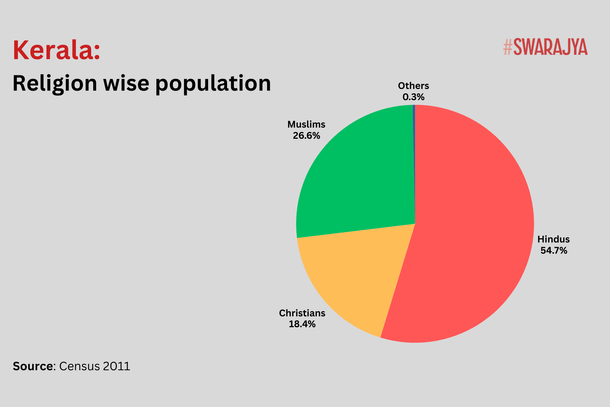
While both Muslims and Christians have traditionally been supporters of the Congress-led United Democratic Front (UDF), the two communities have diverged due to issues like love and narcotics jihad, the increasing importance of the Indian Union Muslim League (IUML) within the UDF, and a disproportionate distribution of minority scholarships. Munambam was the latest flashpoint.
These issues, coupled with dissatisfaction with the Congress and the Left, have brought about a shift in political allegiance, drawing a good number of Christians to the BJP.
But is that enough for the BJP to come to power? A closer examination suggests it would not be.
BJP-Christian Ties: Not All Hunky-Dory
Last month, some people, alleged to be from the Vishva Hindu Parishad (VHP), were accused of attacking a Christmas crib in Palakkad.
Referring to Prime Minister Narendra Modi’s meeting with a group of Bishops in Delhi around the same time, a high-ranking priest from the Malankara Orthodox Syrian Church wrote in a Facebook post: “Over there, bishops are honoured, and cribs are revered. Here, cribs are destroyed. There must be a saying in Malayalam for such behaviour, right?”
While George Kurian, the Union Minister of State for Minority Affairs, condemned the incident, party leaders admit that the protests organised by the Left and the Congress in response did pose challenges for the BJP.
The incident and the reaction to it raised another set of questions. If the outreach was good, would it not be understood that the BJP had not ‘ordered’ such an attack? And are the ties with the Christian community only a ‘tactical alliance’ entered into during election time?
Christians Have Been Losing Influence in Kerala Politics
While Christians are fewer than Muslims today, this was not the case 50 years ago. It was in the 1981 census that the Muslim population was found to have surpassed the Christian population.
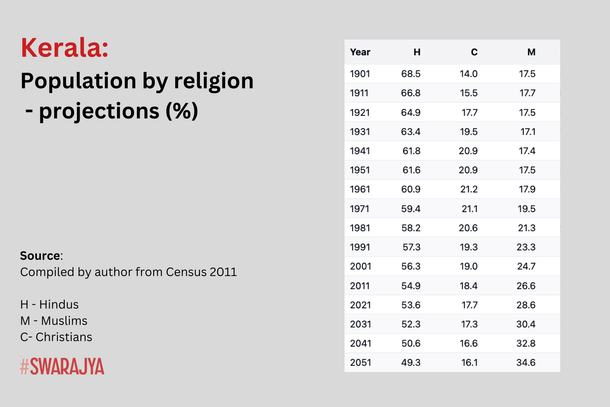
With the population slowdown due to reasons like lower birth rates and reduced migration, Christians' relative importance as a vote bank diminished for both the Congress and the Left.
What kept the community within the fold, however, was the presence of well-known Christian leaders in the Congress, such as Oomen Chandy (who later became chief minister), and the perception of the BJP as a ‘communal’ and ‘anti-minority’ party.
One of the early examples of the Christian community's dissatisfaction with the Muslim bias was the opposition to the induction of M Ali as the fifth minister of the IUML in the Chandy cabinet in 2012.
This was just a couple of years after 2010, a pivotal year with regard to awareness of the rise of radical Islam in the state.
Activists of the Popular Front of India (PFI) had chopped off the hand of Professor T J Joseph that year for framing a question they considered derogatory towards Prophet Muhammad.
The then-chief minister V S Achuthanandan had raised the issue of love jihad, whose victims included Christian women.
It was the start of a social and political change. With the Congress increasingly dependent on the Muslim vote and the Left playing cosy with the Islamists, the only party that spoke about Christian concerns was the BJP.
Nature of the Alliance — Tactical, Economic, Desperate?
Opinions differ on the nature of the alliance.
Some say that the Christian support for the BJP is limited to election time and that if the Congress and the Left were to change their strategy, Christians would support them instead.
But there are others who say there is no going back now for the community.
“Community relations are not the same as before. Every social media post in which Muslims abuse Christians or vice versa contributes to the decline. It is an alliance of desperation,” said a commentator who did not wish to be named.
“When you are pushed to the wall and neither front is willing to listen to your concerns, you are pushed to support a third party; that is, the BJP. And except for the messaging about Hindu culture, there is nothing that they disagree on. The party speaks about development, how the Left’s misrule has bankrupted the state, and how the lack of a business-friendly climate is making it difficult to bring in investments,” the commentator adds.
A priest at a Malankara church in Pathanamthitta, who did not wish to be named, said: “We are clear that the threat to us is not from Hindus. It is from radical Islam. The PFI rally in which a young boy chanted slogans asking us to keep amber ready for our death rituals was enough of an example to show us how deep the indoctrination is.”
According to Joseph, Christians largely know that going back to the Congress means the return of appeasement politics. “They know who banned the PFI and who looked the other way. They know who stood with them on the issue of love jihad.”
Those who believe the BJP-Christian alliance to be based around economics point to a statement by an archbishop as evidence.
The archbishop had said the BJP could get its first Member of Parliament from Kerala if it increased rubber prices.
While the remark did create a flutter, with all the parties pledging to work for the welfare of rubber farmers, the issue seems to have died down after the elections.
Not All Christian Groups Are With The BJP
Similar to Hindus, the Christian community in Kerala is divided. While some groups are receptive to the BJP, others are not so much.
The major Christian sects of the state are Syro-Malabar, Syro-Malankara, Latin Catholic, Jacobite, Syrian Orthodox, Church of South India (CSI), and Pentecost.
Of these sects, the Syro-Malabar are the largest in number, followed by the Latin Catholics. The CSI and Pentecost are the smallest groups and also the most evangelical, according to some commentators, putting their interests at odds with the BJP.
The BJP has made its mark amongst the Syrian Christians.
“The Syrian Christians are amongst the wealthiest groups in the state. They are involved in a variety of commercial activities, and thus the well-being of the economy is an important consideration for them.
"With no hope from the Left and Rahul Gandhi’s talk of wealth redistribution and "jitni abadi utna haq" putting them off, they have no choice left, except for the BJP. It is the only party consistently talking about development or vikas,” a political commentator said.
“A Christian-Hindu alliance is not new to the state,” he added. "The Congress governments of all these years were based on the support of Christians and upper-caste Hindus. So they have been together in power and also enjoy good relations at a social level.”
Only two Christian groups in the state are eligible for reservation: the Latin Catholics and CSI. So, except for these two sects and the poorer sections amongst the Christians, reservation and redistribution are not a draw for the community. They are keener on securing better opportunities for their children, whether in jobs or education.
Speaking about the issue, a college principal in Thiruvalla said, “If you look at our households, you will often find that only elderly parents are residing here. Their children, who have migrated abroad, have no intention of returning because there aren’t enough good jobs in Kerala.”
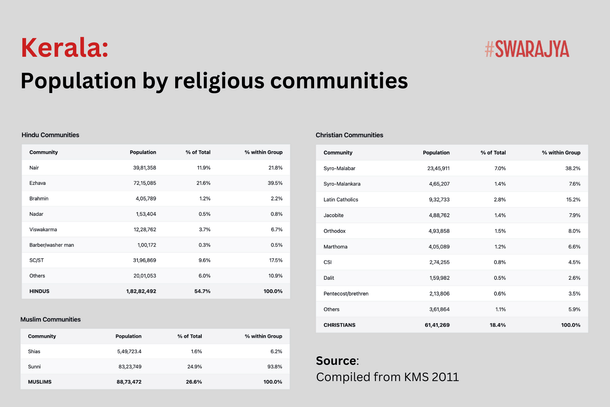
Munambam Possibly a Turning Point for Latin Catholics
The BJP does not enjoy much support among Latin Catholics. Unlike the CSI and Pentecost groups, this community's electoral significance is larger, and in Lok Sabha constituencies like Thiruvananthapuram, they can determine the winner. The fishermen from this community were at the forefront of the protests against the Vizhinjam port.
“They have a close relationship with the Congress. Even the candidates are often selected with the advice of Bishops. Till this moment, they were not affected very much by Muslim dominance. That has changed after Munambam.
"It has to be seen if, after all this, do they still stick with the party or look for a change. Ramesh Chennithala, a senior Congress leader who went there (Munambam) recently, got an earful from the locals,” a BJP leader said.
The IUML, too, has realised that alienating Latin Catholics could prove costly for the UDF. Two of its seniormost leaders, Panakkad Syed Sadiq Ali Shihab Thangal and P K Kunhalikutty, travelled to Kochi to meet leaders of the church.
The BJP does not have any specific plans for these three groups, according to Joseph. “But we are doubling down on our outreach efforts amongst those who have not yet been convinced to vote for us.”
Christian Votes Helpful, But Won't Take BJP to Power
Party leaders this writer spoke with say that the BJP's outreach towards the Christian community has worked. That is why the BJP has been able to bring in leaders like P C George, his son Shone George, and Anil Antony.
However, it is also true that the BJP continues to lack recognisable Christian faces on the ground.
Except for George and his son or Kurian, there are no grassroots Christian leaders of note in the BJP.
The party once had P C Thomas, who also served as a minister in the Atal Bihari Vajpayee government. During the first Modi government, Kerala’s Christians were represented by Alphons Kannanthanam, who still was not a grassroots politician but a former bureaucrat.
This is not the case with the Congress or the Communist Party of India (Marxist). They have notable faces at all levels, cutting across communities.
Acknowledging this reality, a political commentator said this is why the BJP must ensure it does not lose sight of the larger goal of consolidating Hindu votes.
“Christian votes can only take you so far. It would be very difficult to garner support beyond a certain level because there will still be some sections who would be opposed to the BJP due to fanaticism or the zeal to convert.”
Consolidating Hindu Votes
The Hindu community comprises a little over 50 per cent of Kerala’s population. Their vote is divided amongst all three parties.
It is only recently that the BJP has been able to get a sizeable support amongst the two large Hindu communities — Ezhavas and Nairs. While the Ezhavas are the backbone of the Left, the Nairs were earlier with the Congress.
The BJP has an alliance with the Bharat Dharma Jana Sena (BDJS), a party representing the interests of the Ezhava community.
Together, these communities comprise about 30-35 per cent of the state’s population. The rest of the Hindu population (15-20 per cent of the state's total population) is comprised of non-Ezhava Other Backward Classes (OBCs), Scheduled Castes (SC), and Scheduled Tribes (ST). At present, these groups are mostly with the Left.
While a start has been made in this direction, with the party garnering good support from the Dheevara OBC community (whose traditional occupation is fishing) during the 2024 election, in constituencies like Alappuzha, this is an area that the BJP needs to work on.
If the BJP is able to consolidate the Hindu vote and build upon the foundation it has laid amongst Christians, it will be a strong force across the state, and not just in pockets, as is the case now. While the path is not easy, the journey is definitely doable.
S Rajesh is Staff Writer at Swarajya. He tweets @rajesh_srn.





